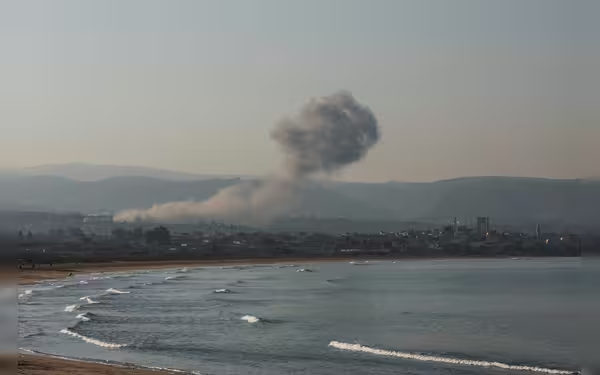Saturday, November 16, 2024 03:20 PM
Israel Escalates Conflict in Lebanon, Displacing Thousands
- Nearly 500,000 Lebanese civilians displaced due to conflict.
- Humanitarian crisis looms as shelters become overwhelmed.
- UN allocates $24 million for emergency aid in Lebanon.
 Image Credits: arabnewspk
Image Credits: arabnewspkThe conflict in Lebanon escalates as Israel intensifies airstrikes, displacing nearly 500,000 civilians and raising humanitarian concerns.
In recent weeks, the situation in Lebanon has escalated dramatically as Israel has intensified its air campaign against the Iran-backed Hezbollah militia. This military action has led to the displacement of nearly half a million Lebanese civilians from their homes, particularly in southern Lebanon and the Bekaa Valley. The ongoing conflict raises serious concerns about a potential humanitarian crisis in a country already struggling with a severe economic downturn.
Lebanon, which has been grappling with multiple crises, is now facing an influx of displaced individuals from towns and villages near the Israeli border. Many of these areas have suffered extensive damage, with entire neighborhoods reduced to rubble. The question on the minds of those fleeing is whether their displacement will be temporary or permanent. Tania Baban, the Lebanon country director of the US-based charity MedGlobal, expressed her concerns, stating, "We don’t think this is going to last only for a short duration. Some people may not be able to go home if their home is no longer standing." This sentiment reflects the uncertainty and fear that many families are experiencing.
Since the conflict reignited following the October 7 attack on Israel, which triggered the war in Gaza, southern Lebanon has become a battleground. Israeli forces have conducted near-daily bombardments in retaliation for Hezbollah's rocket attacks on northern Israel. The Lebanese foreign minister, Abdallah Bou Habib, reported that approximately 500,000 people have been displaced, with many fleeing from cities like Tyre, Sidon, and Nabatiyeh. In Tyre alone, about 70 percent of the population has evacuated, as confirmed by the city’s mayor, Hassan Dbouk, who noted, "People could not tolerate it anymore."
As civilians attempt to escape the conflict, they face significant challenges. Highways leading from the south are congested, with some individuals spending over 12 hours on journeys that typically take only one or two. While some have found refuge with friends or family, the sheer number of displaced people is overwhelming Lebanon’s ability to provide adequate shelter. Schools, community centers, and unfinished buildings are being converted into temporary accommodations, but the government is ill-equipped to manage a large-scale relief effort due to ongoing political and financial crises.
Humanitarian organizations are stepping in to help, but they face their own challenges. Hovig Atamian, director of programs at CARE International in Lebanon, highlighted the difficulties, stating, "Humanitarian organizations have been preparing for the worst-case scenario of a very significant escalation for months now, but the reality on the ground, including access constraints due to the security risks, will always remain a challenge." With international funding already stretched thin due to other global crises, there are fears that Lebanon may not receive the necessary humanitarian assistance.
In response to the urgent needs of those affected by the conflict, Imran Riza, the UN humanitarian coordinator for Lebanon, has allocated a $24 million emergency aid package. However, as the situation continues to deteriorate, the needs of the displaced population are likely to grow. Charities like MedGlobal are mobilizing to deliver essential items, including food and basic supplies, to those in temporary shelters.
The plight of the Lebanese people amidst this conflict serves as a stark reminder of the human cost of war. As families are torn from their homes and communities, the international community must remain vigilant and responsive to their needs. The hope is that peace can be restored, allowing displaced individuals to return to their homes and rebuild their lives. Until then, the resilience of the Lebanese people will be tested as they navigate this challenging and uncertain landscape.













